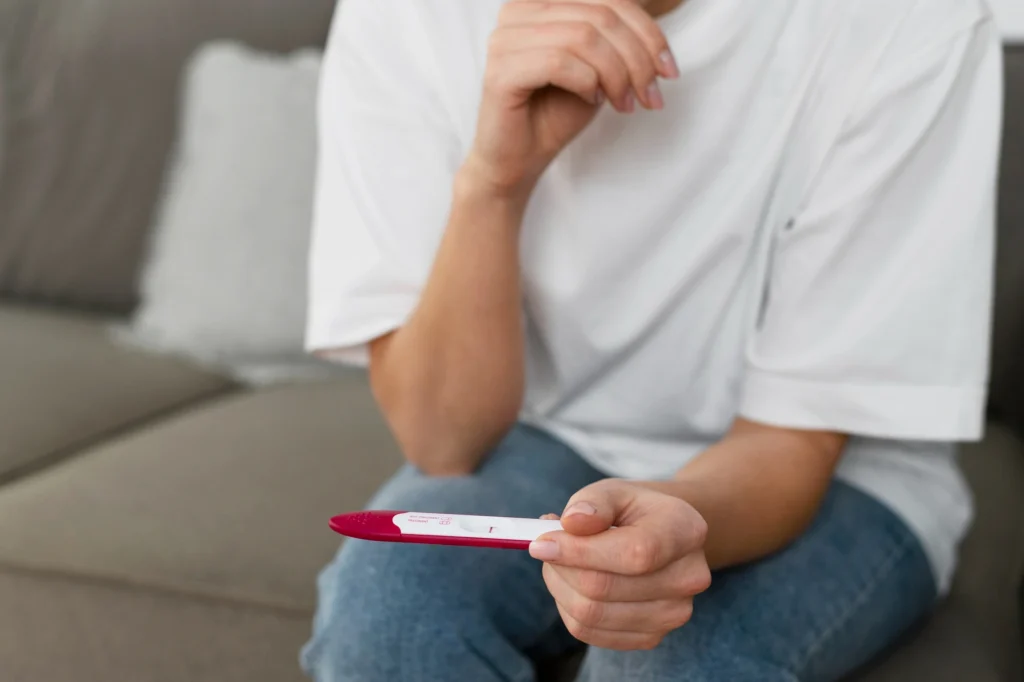As a woman facing fertility challenges, you may feel overwhelmed by the complex factors affecting your reproductive health.
This article aims to provide you with a clear understanding of how endocrine disruptors, chronic stress, and nutrition impact your fertility, particularly your follicular health.
We’ll also explore how acupuncture and herbal medicine can offer support on your journey to conception.
Understanding Follicular Health
Follicles are tiny sacs in your ovaries that contain eggs. The health of these follicles is crucial for successful ovulation and conception.
Several factors can influence follicular quality, including:
- Endocrine Disruptors: These are chemicals found in everyday items like plastics, pesticides, and cosmetics that can interfere with your body’s natural hormones.
- Chronic Stress: Ongoing stress can disrupt the balance of reproductive hormones essential for proper follicular development and ovulation.
- Nutrition: Your diet plays a critical role in supporting follicular quality by providing necessary vitamins, minerals, and healthy fats.
The Impact of Endocrine Disruptors
Endocrine disruptors can mimic or block the action of important reproductive hormones, leading to:
- Irregular ovulation or anovulation (absence of ovulation)
- Impaired egg quality
- Hormonal imbalances affecting egg maturation and overall ovarian health
To minimize exposure to these harmful chemicals, consider:
- Choosing organic foods when possible
- Reducing the use of plastics, especially for food storage
- Switching to natural cleaning and personal care products
- Using BPA-free containers or opting for glass or stainless steel alternatives.

The Role of Chronic Stress
Stress triggers the release of cortisol, which can disrupt reproductive hormones when elevated for extended periods.
This can result in:
- Impaired ovarian function
- Poor-quality eggs
- A less receptive endometrial lining
To manage stress, try incorporating:
- Meditation or mindfulness practices
- Yoga or gentle exercise
- Breathing exercises
- Tai chi or qigong
Nutrition and Follicular Health
A balanced diet is crucial for maintaining hormonal balance and supporting egg development. Consider including:
- Omega-3 fatty acids: Found in fatty fish, flaxseeds, and walnuts, these can improve blood flow to the ovaries and support hormonal balance
- Antioxidant-rich foods: Berries, leafy greens, and nuts can protect eggs from oxidative stress
- Vitamin D: Ensures adequate levels to support overall reproductive health
- Folic acid: Supports egg maturation and early embryo development
Avoid excessive sugar and refined carbohydrates, as they can lead to insulin resistance, which is often associated with polycystic ovary syndrome (PCOS) and impaired follicular development.

Acupuncture and Herbal Medicine: Holistic Approaches to Fertility
Acupuncture and herbal medicine offer complementary approaches to improving follicular health and overall fertility.
Acupuncture
- Improves blood flow to the ovaries
- Reduces stress hormones like cortisol
- Helps balance reproductive hormones
- Regulates the autonomic nervous system
Herbal Medicine
- Supports hormonal regulation
- Enhances ovarian function
- Promotes egg quality
- Balances estrogen and progesterone levels
- Reduces inflammation
Lifestyle Modifications for Improved Fertility
In addition to the above strategies, consider these lifestyle modifications:
- Exercise: Engage in moderate physical activity like walking, swimming, or yoga to maintain a healthy weight and regulate hormonal levels.
- Environmental Toxin Reduction: Limit exposure to endocrine disruptors by choosing organic products and natural alternatives when possible.
- Fertility Supplements: Consult with Mike Berkley about supplements that may support ovarian function, such as:
- Coenzyme Q10 (CoQ10)
- Inositol
- Folic acid

Conclusion
Fertility is a complex interplay of various factors, including physical health, mental well-being, and environmental conditions.
By understanding how endocrine disruptors, chronic stress, and nutrition affect your follicular health, you can take proactive steps to improve your chances of conception.
Remember that every woman’s journey is unique. Integrating traditional wisdom with modern science, such as acupuncture and herbal treatments, offers a balanced approach to optimizing fertility.
By making conscious lifestyle changes and exploring holistic options, you can create a more favorable environment for conception and increase your chances of a healthy pregnancy.
References
- Ristow, M., & Zieger, M. (2015). Endocrine Disruptors and Reproductive Health: The Role of Environmental Chemicals in Fertility. Journal of Environmental Health Perspectives, 123(7), 19-23.
- Diamanti-Kandarakis, E., et al. (2009). Endocrine-Disrupting Chemicals: An Endocrine Society Scientific Statement. Endocrine Reviews, 30(4), 27-42.
- Kallio, J., & Stener-Victorin, E. (2011). The Impact of Stress on Reproductive Function: Clinical Perspectives. Journal of Endocrinology, 210(1), 1-14.
- Torres, R., et al. (2014). The Effects of Stress on Ovarian Function and Fertility. Human Reproduction Update, 20(5), 642-655.
- Kirkham, J. A., et al. (2012). The Role of Nutrition in Reproductive Health: A Review of Dietary Modifications in Women Trying to Conceive. Journal of Nutritional Biochemistry, 23(6), 497-509.
- Agarwal, A., et al. (2012). Oxidative Stress and Antioxidants in Male Infertility: A Review. Journal of Andrology, 33(6), 18-32.
- Steiner, A. Z., et al. (2014). The Effect of Body Mass Index on Ovarian Reserve: A Study in Women Trying to Conceive. Fertility and Sterility, 101(6), 1302-1307.
- Stener-Victorin, E., & Waldenström, U. (2015). Acupuncture and Herbal Medicine in the Treatment of Infertility. Journal of Alternative and Complementary Medicine, 21(4), 267-274.
- Lundeberg, T., Lund, I., & Naver, H. (2010). Acupuncture and Fertility: A Review of Mechanisms and Evidence. Journal of Acupuncture and Meridian Studies, 3(4), 134-141.
- Kim, Y. S., et al. (2013). Herbal Medicine in the Treatment of Infertility: A Review of Traditional Use and Scientific Evidence. The American Journal of Chinese Medicine, 41(3), 473-488.
- Lee, H. S., et al. (2012). The Role of Herbal Medicine in Women’s Reproductive Health: A Review of the Evidence. Fertility and Sterility, 97(2), 343-350.
- Wang, L., & Zhou, L. (2016). Traditional Chinese Medicine in the Treatment of Infertility: A Review of Mechanisms and Efficacy. Journal of Traditional and Complementary Medicine, 6(4), 335-340.
For more information or to schedule a consultation at The Berkley Center for Reproductive Wellness, please contact us at 212-685-0985 or visit our clinic at 16 East 40th Street, 4th floor, New York, NY 10016.
www.berkleycenter.com



